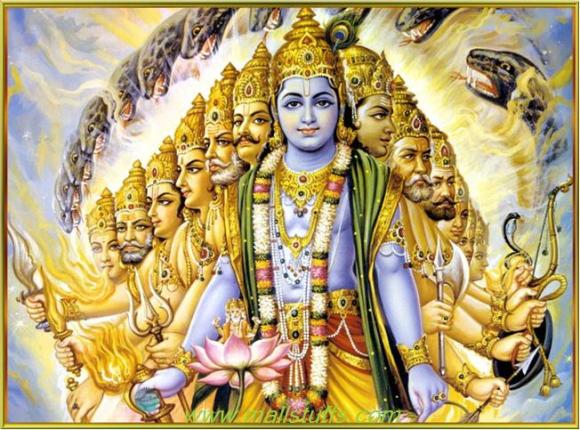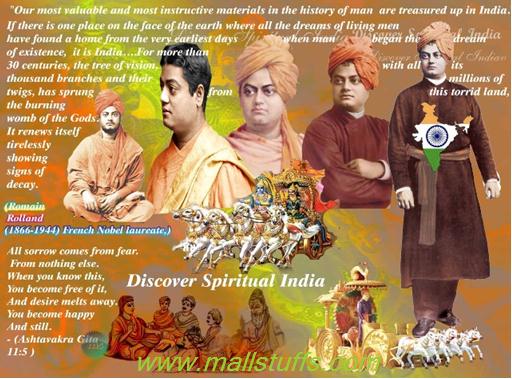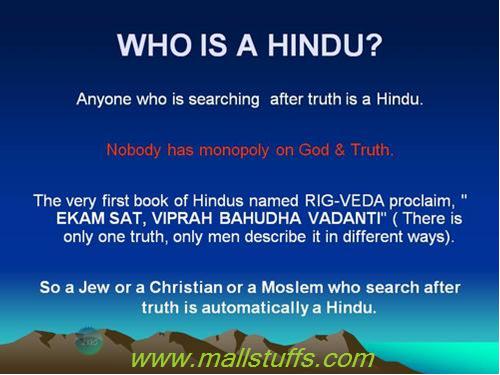
Why hinduism is not a religion but a culture
Hinduism is mankind oldest culture, the only one that predates recorded history and so is better known as “the mother of all religions” and “cradle of spirituality”. Hinduism is based on absolute universal truth.In this article, we will go through the various beliefs in Hinduism that makes it a cultural way of living life and not a religion.
What religion means to us?
To understand why Hinduism is not a religion, we must first know what religion is? By definition, a religion is founded by a person/prophet with a set of beliefs that guides how to worship/attain personal god.
Religion can be broadly defined as
1) Organized collection of beliefs, ceremonies, practices, rituals and beliefs.
2) Interest or activity performed diligently by a individual, group and community
3) An institutionalized system that defines the basis of various beliefs, rituals and traditions.
4) Set of beliefs, ethics and rituals practiced by followers based on the instructions/commandments of the prophet/spiritual leader.
5) Headed by a representative selected by the body of several religious leaders.
Why is Hinduism NOT a religion?
Now that we know briefly the meaning of religion, Let us try to address the following questions on Hinduism
1) Which institution/organization guides Hinduism?
2) Who is selected representative/head of Hinduism?
3) Who is the only one personal god in Hinduism?
4) Who is founder/prophet of Hinduism?
5) Which is one holy book of Hinduism?
6) What are the beliefs, ceremonies, practices, rituals and beliefs common to all Hindus?
<>
Well, we don’t have a single answer to any of the above questions. Hinduism has no single holy book, no single religious head, no single personal god, no single founder and no single institution. Though the beliefs of Hinduism can be manipulated to show it as a religion, in reality as it is known to all Hindus, Hinduism is a cultural way of living life.
Why is Hinduism a Culture?
What’s more in Hinduism that makes it a cultural way of living life and not a religion. You practice religion but follow your culture. It is mandatory to practice dogma and doctrines of religion but not mandatory to follow your cultural values and ethics. Religions have fixed set of laws while culture doesn’t. In Hinduism, there is no compulsion of practicing anything; it is just about following your culture. What is this culture i am talking about? Below are some of the beliefs of hindu culture.
Atheist Hindu
In Hinduism, there is no authorized person to dictate the do and don’t in Hinduism. So, nobody can compel you to accept any god. Hinduism gives you the liberty to not believe in god and yet be called as a Hindu. Unlike other religion that wants you to stick to rigid dogma and doctrines, Hindus are free and are not threatened or punished for living an atheistic life.
<>

Follow any religious book
Hindus don’t have any one book as the point of authority. There are many religious books like Vedas, Upanishads, puranas, Dharma shastras, mahabharat, Ramayana, gita etc and everyone has the right to agree or disagree with the teachings of these religious books. In fact, Upanishad and gita are full of critical debates where the lord/guru answers the queries of the devotees.
No conversion in Hinduism
Just like all streams and rivers reach the same ocean, Hindus believe that all true religions reach to the same supreme god. Since worship of any divine being leads to the same god, Hindus don’t try to convert anyone to their faith. We don’t have any missionaries that go from nation to nation to convert poor souls to Hinduism. Concept of conversion is not found in any of the Hindu scriptures.
Everything is divine in Hinduism
Everything is considered as divine in Hinduism. Plants and animals are considered as divine because of their crucial role in maintaining the ecological balance of our nature. Plants are worshipped for they provide us with shelter, food and oxygen. Even the natural elements like river, air, fire, mountains, water, sun, planets, and minerals are regarded as divine in Hinduism.
<>
Hindus believe this world as one big family
Hindus don’t consider followers of other cultures, races or faiths as competitors, enemies or outsiders. Unlike other religions that divide peoples, Hindus believe in Vasudhaiva Kutumbakam, meaning “world is one big family”. It’s the human fault to treat all living beings unequally. In the eyes of god, every being is divine and were created equally. So, we say “Sarve Bhavantu Sukhinah”, meaning “May all living beings live happily in peace and prosperity”
Rituals and mode of worship
Ritual and beliefs of Hindus varies from region to region. Most of the Hindus worship idols of gods in home or temples and offers. Coconut, incense sticks, fruits, flowers, oil lamps, camphor etc. Singing, dancing and chanting mantras is common to all Hindus.
<>
Worship any God
Hinduism does not believe in one personal god or in a god having only one form. Since god is almighty, he can have any form, he can have many forms, he is Omni-present, he is transcendental, he is all knowing, he is all protecting and so on...

Many forms of same god can be understood from Lord Krishna Virat roop darshan
Most of the Hindus worships all manifestations(Gods/Goddesses) of the same supreme divine being. Note the key point here. Unlike all other religions, Hindus also sees divinity in female form of supreme Brahman. Different sects of Hinduism worship the same universal Brahman by different names. This is why Vedas says “Ekam Sat, Vipra Bahuda Vadanti”, meaning “God is one, but the sages call him by many names”. Thus, Hindus have the right to worship god in any form and so can go to any church, mosque, synagogue etc.
<>
Hindus respect nature
Hindus don’t cut trees because they believe in ‘Tarudevobhava’, meaning ‘trees are divine’. Respecting nature and its preservation is one of the fundamental beliefs of Hinduism.
In coastal religion of southern India, ancient tribal settlement has created a special animal zone called as Kaavu or Haadi. Kaavu or Haadi is a home only for wild animals that are designed following the ancient method of Vaastu-shastra. Vaastu shastra is followed to build structures without disturbing the natural flow of fauna, animals, wind, fire and other natural energies. Vaastu shastra is all about peaceful co-existence of all living and non-living entities. Kaavu or Haadi is treated as sacred and is left untouched by humans. This tribal settlement were aware of their encroachment of land that naturally belongs to wild animals/birds and so created a special forest area to minimize the conflict and ensure complete protection of all wild species.
<>
Hindus follows a natural healthy lifestyle
Hindus wake up early in the morning to practice yoga and meditation for a healthy and sound mind. Yoga is not a fitness technique; it is all about controlling your mind and body. It starts from telling how to breathe and ends with connecting your soul with the supreme divine god. Similarly, Ayurveda is wrongly believed as pure medicinal system; instead it is a set of ancient practices that reflects the way of living life without the need of any artificial medicines. Hence, both yoga and ayurveda is a part of natural lifestyle.
<>
Tolerance and non-violence
One of the most important beliefs of Hinduism is Ahimsa or non-violence. Ahimsa means “absence of desires to harm others”. Since Hindus believes in divinity of all living creatures, they practice ahmisa to love and adore all animals. This is the reason why most of the true Hindus follow vegetarianism. According to bhagavad gita, Garv(Pride), Darpa(arrogance), kruratva(cruelty), Krodh(Anger) and dvesha(hatred) are the enemies of humanity and are said to be demoniac qualities. Sanatana dharma encourages its followers to seek moral and ethical truth from all sources. So, Hindus are open to positive aspects of Christianity, Islam and other major religions. Hinduism view of universal brotherhood and willingness to accept individuals and beliefs of all faiths, religions, caste, creed etc, makes it the highly tolerant belief system. World greatest freedom fighter ‘Mahatma Gandhi’ is known for his teachings on tolerance and non-violence.

All of the above beliefs can be followed without adhering to worship of any one personal god. These rational beliefs reflect Hindu culture, and every Hindu makes a rational choice to follow the beliefs they wanna believe in. Hinduism is a continuous evolving culture that discards the old lifestyles if it is no longer suitable to an individual, society or nation in general. Lifestyles of Hindus vary from region to region and time to time and thus Hinduism is a culture, not a religion.
Below judgment from Supreme Court of India expresses the same sentiment on Hinduism.
“Hindutva is indicative more of the way of life of the Indian people. It is not to be understood or construed narrowly. It is not hindu fundamentalism nor is it to be confined only to the strict Hindu religious practices or as unrelated to the culture and ethos of the people of India, depicting the way of life of the Indian people. Considering Hindutva as hostile, inimical, or intolerant of other faiths, or as communal proceeds from an improper appreciation of its true meaning”
<>
How is Hindu lifestyle/culture?
Hindus have the freedom to live either a household life or an ascetic life. Both the paths are equally glorious if followed religiously. The lifestyle of Hindus can be divided in four stages
Brahmacharya or bachelorhood (1 to 25 years): This is the stage of learning and growth. One should undertake spiritual lessons from a bonafide guru, build up his body, mind and senses to face the responsibilities of next stage.
Grihasthya or householder (25 to 50 years): One should marry and fulfill his household duties. Additionally, one should strive to earn artha i.e money, valor and honor following the paths of good karma (deeds) and dharma (righteousness). The karma (Cause effect law) we do in our current life not only decides the destiny of our current life but also the fate of all our future births. By future birth, I mean Hindus believe in the reincarnation of soul until the soul undergoes penance for the committed wrong sins after which the soul is eligible for moksha i.e liberation from repetitive cycle of birth and death.
Vanaprastha or forest life (50 to 75 years): This is the stage of gradual detachment from the materialistic world. One should hand over household duties to his/her sons/daughters and should spend more time in practicing austerities and making holy trips/pilgrimages.
Sanyasa or renunciation(75 to 100 years): This is the stage of complete renunciation from the materialistic world. One should go into seclusion mode, should do meditation in the forest to invoke our divine consciousness and then peacefully give up the body to attain either salvation or birth in next higher form of life.
Is everyone a hindu?
Irrespective of your religion, each one of you follows one or more of the concepts stated above. According to Sanatana dharma, anyone who is striving for spiritual perfection and follows the right sets of action is a follower of Sanatana dharma. By this definition, everyone in this world is a Hindu though they are not totally aware about it.
<>

Conclusion
Sanatana dharma means the eternal, unchanging relationship of the soul with the Supreme Being. If one follows the principles of Sanatana dharma, he is on the path of regaining his forgotten spiritual self and its connection with god. Self realization and consciousness is the goal of sanatana dharma. Knowledge of Vedas, Upanishads and gita is not limited to only Hindus, but for the whole humanity since each one of us is a spiritual being and has the right to re-establish the relationship with god. Soul is the universal supreme truth that applies to all individuals irrespective of the place he lives in, irrespective of the time he lives in and irrespective of the religion he belongs to. Soul is eternal and the only truth beyond time and worldly designations.
Note: Images used on this website
are either a production of Bhaktivedanta Book Trust(https://www.krishna.com), Iskcon
Foundation or were found in google search under "Free to use and share". If any
of the images presented here violates copyright issues or infringes anyone copyright
or are not under "Fair use", then please bring it to our notice. Read
Disclaimer for more.
Share this to your friends. One of your friend is
waiting for your share.
Related Articles
Swastika in american private buildings and historical monuments
Swastika in american government buildings and historical monuments
Why hinduism is not a religion but a culture
Was einstein a theist and believer of hinduism
What makes a Hindu proud of their cultural heritage
Why hindu intolerance is rising in india
Post Comment